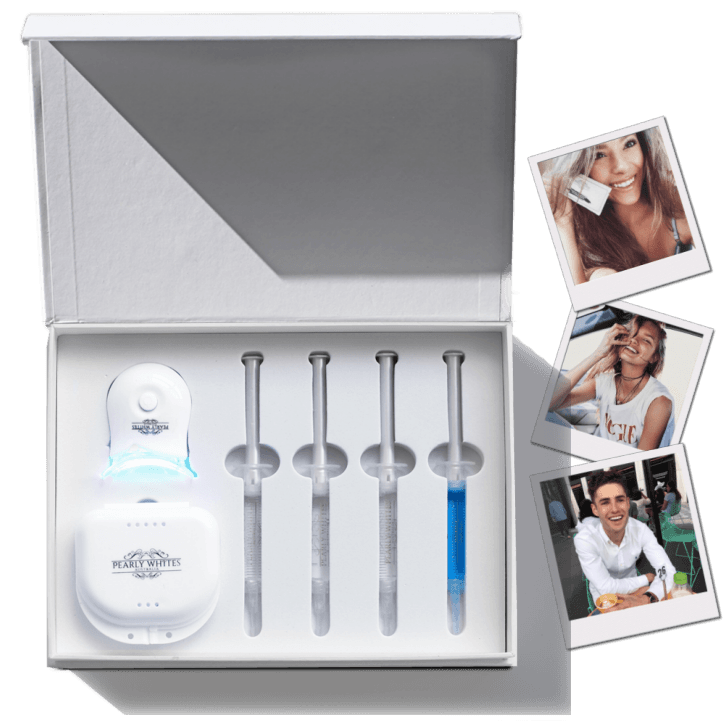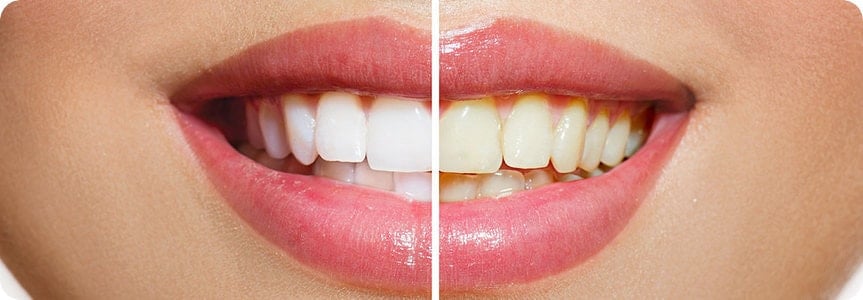There are a lot of teeth whitening options, each has its benefits and some are more effective. Before undergoing teeth whitening, we recommended that you read our detailed guide to ensure optimal results.
Teeth Whitening Treatments
Professional Teeth Whitening
Teeth whitening completed by a dentists offers outstanding results, and the side effects are very mild. The treatment procedure is simple, and with a professional whitening regimen, you would have a radiant smile like a celebrity.
Also known as chair side bleaching, this is the most popular whitening technique in the cosmetic industry, and the process is monitored by specialists. It's one of the most effective treatments and involves the use of the whitening agent directly to the tooth. The dentist examines the patient’s dental history to find out about the allergies (if any) and observe the soft and hard tissues.
The dentist will apply a protective gel or a rubber shield to your teeth, and then bleach is applied. Sometimes, your dentist can use a laser for long lasting effects. The process is most effective with yellow teeth and least with grey teeth. You can have visible results after a single treatment, which usually takes less than an hour. It's an expensive approach, however this is the most effective and will produce the most dramatic results.
Home Teeth Whitening
Home teeth whitening has become increasing popular, in the past you have had to spend over $700 for in-chair teeth whitening at your dental office. Without a doubt, Pearly Whites is the most trusted and known kits on the Australian market. Without outstanding reviews and an affordable price you can expect excellent results.
If you have ever wanted a brilliant white smile at home teeth whitening kits offer an affordable and safe solution. Compared to expensive in-chair teeth whitening by a dentist at home teeth whitening kits provide everything you require with amazing results.
- Safe and Pain Free with Free Delivery
- Highest legal grade - 18% carbamide peroxide
- Includes everything you need to whiten your teeth in the comfort of your own home
Teeth Whitening Kits Prices
Whitening Toothpastes
Whitening toothpaste rarely contains any bleaching agents like hydrogen peroxide or carbamide peroxide. Rather, they have calcium carbonate or silica and alumina, which can be used to remove the stains from teeth layers. Any whitening toothpaste will help you to remove the surface stains, since they have mild abrasives. However, the problem is that they do just that - they do not contain any polishing or whitening agents that can help you do more, as a result the outcome is typically poor.
It's advisable not to use whitening toothpaste for a longer term, as they contain enzymes and can cause dental abrasion or thinning of the enamel layer. You can instead go in for over-the-counter professional whitening products that can help clean and whiten your teeth much better, as they contain chemical agents like hydrogen peroxide.
While whitening toothpastes can whiten your teeth by about one shade. Compared to professional teeth whitening performed by your dentist teeth whitening products such as Zoom! can whiten teeth four to seven shades lighter.
Whitening Strips and Gels
You can use whitening gels at home. Peroxide based, they are applied directly to the teeth with the help of a brush. Do take a look at the instructions given with the whitening gel you buy since the instructions can vary according to the strength of the peroxide.
You will need to brush your teeth before applying the gel. Apply it during the night and use for two weeks for the best results. Don’t swallow the gel. You will see the first visible results after several weeks. And if you are using it for a several months, the results will be visible.
Whitening strips, on the other hand, are slender and gel based. They come in different flavours. Today there are peroxide-free whitening strips available. Use it for twice a day for around thirty minutes each and the results are almost instant. You have to apply them for at least fourteen days, but the results are visible within a three of four days.
Teeth Whitening Rinses
Whitening rinses are nothing but mouthwashes with antiseptic solutions. They temporarily whiten the teeth and control bad breath and are used after brushing the teeth. It's one of the best methods to get a fresh breath, and will help you reduce the level of dental plaque as well. If you use them over the longer term, they also help in preventing any gum disease.
Some of them may contain whitening agents and you need to check if your whitening rinse contains any ingredients like hydrogen peroxide.
You can either hold it in the mouth or gargle it. It's a good idea to use them twice daily, and for around a minute each time, before you brush your teeth. However, the results are often not as you would like, and you would have to wait as much as twelve weeks before you can see the results.
Another downside is that many dental experts believe it to be not as effective as other the counter whitening products - solely because it's in contact with your teeth for less than two minutes.
It's a relatively low risk procedure, and the ideal patients are those who have mild to moderate discoloration for their teeth. Though there are not many side effects of this treatment, it might not be perfect for you in the following scenarios.
Frequently Asked Questions - Teeth Whitening
Can Everyone Have Teeth Whitening?
Patients with fabrications or restorations on the front facing teeth, such as porcelain veneers, dental crowns or dental bonding aren't likely to respond to this form of treatment, since restorative materials isn't made to respond to bleaching agents like natural teeth. Teeth whitening work only on natural teeth and have no effects on false teeth or dental crowns.
The treatment isn't as effective on patients with intrinsic stains, so it doesn't work on any 'dead' tooth, such as those teeth which have undergone root canal therapy. It only works great on extrinsic stains, like yellow and brown stains that have not yet affected the inner enamel. Intrinsic stains are the stains that are inside the tooth. Sometimes, there is bleeding in the teeth that lead to intrinsic stains, which are yellow or brown in colour. Teeth whitening can cure these intrinsic stains.
Patients with extreme tooth sensitivity are advised against this procedure as well, as it can enhance the sensitivity level.
Patients with bruxism, or temporomandibular joint disorder (TMD) should not opt for whitening agents as it may cause more damage to them. Bleaching should be done under supervision.
How Long Does Teeth Whitening Last?
The effects last from four months to one year. You can get touch ups done in between. Teeth whitening is not a permanent procedure and if you love to eat food which can easily stain, you may see discoloration in as little as several months depending on the treatment you have used.
On the other hand, home remedies only last for a few days to a week or two- the effects are not permanent. The degree of whiteness and how long it would remain depends on different factors that include everything from the condition of your teeth to how good your oral hygiene is.
What Can I Expect After Teeth Whitening?
If you have had to go teeth whitening, do not consume tobacco, coffee or tea for a few days as this may damage the bleaching. Also, avoid very cold or hot foods when possible. Depending on the active agent used for the teeth whitening you may also experience teeth sensitivity lasting for several hours to a few days.
Does Teeth Whitening Hurt?
Over bleaching can hurt. Also, the method involved plays a part. The problems go within 3 days of the treatment, and if the pain is severe, dentists can also advise the use of a teeth whitening spray that can help decrease your teeth sensitivity levels.
Are There Any Risks Involved?
There could be hypersensitivity, irritation of the gums and uneven results. If the whitening process is overextended, the teeth may turn grey. The peroxide products if not applied properly may burn your gums. That is why it is better to always consult a dentist.
Will Teeth Whitening Make My Teeth Sensitive?
Yes, it leads to a temporary sensitivity of the teeth. However, you should be fine by the next morning.
Does Whitening Have Any Effect on Fillings or Crowns?
Tooth whitening has no effect on them. Your teeth will not change their colour. You should replace your fillings and crown after the process if you wish for a change.
How Old Do You Have to be to Whiten Your Teeth?
Children below 16 years are recommended to stay away from bleaching as this could harm their teeth.
How Much Whiter Will My Teeth Be?
This depends on the procedure that you choose. Yellow coloured teeth will be whitened more. However, gray colour teeth will not show much change.
Can I Continue Smoking After Teeth Whitening?
Smoking will only harm your teeth and will show bad results. Smokers should quit it for at least one or two weeks, as it will spoil the teeth whitening results.
How Can I Retain my White Teeth?
Brushing or rinsing immediately after drinking, chewing gum, avoiding too hot or cold beverages and going for touch ups. You can also drink beverages through straws to protect your teeth.




